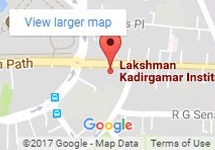
Reading Time: 2 min read
On 15 August 2017, Dr. Ganeshan Wignaraja, Chair of LKI’s Global Economy Programme, made an invited presentation at the Central Bank of Sri Lanka on “Reinvigorating Trade, Global Supply Chains, and Small-Medium Enterprises (SMEs) in Asia”.
The presentation focused on opportunities for industrial latecomers and their firms in global supply chains, in the wake of a modest recovery from the global trade slowdown.
His conclusions were:
- Global supply chain trade has become an increasingly important part of world trade, with East Asia as its global hub.
- Although the rate of export growth has fallen below the rate of GDP growth in the post-global financial crisis era, developing Asia’s trade growth seems to be picking up in 2017 amid policy uncertainty.
- There are opportunities in global supply chains for emerging economies, including Sri Lanka, due to a gradual recovery in industrialised economies and moderate growth in China.
- SMEs in ASEAN have the potential to expand further into global supply chains, both as direct exporters and as suppliers of intermediate inputs and services.
- East Asia’s experience suggests that there is no ‘one size fits all’ approach for SMEs to join global supply chains trade.
- East Asia’s experience suggests that the following factors facilitate entry into global supply chain trade:
- Smart business strategies that (1) encourage mergers and acquisitions, (2) forge business alliances between large firms and SMEs, (3) facilitate industrial clustering, and (4) create industrial technological capabilities.
- Deep structural reforms that (1) reduce tariffs on intermediate imports, (2) streamline customs procedures, (3) raise labour productivity, (4) boost R&D activities, and (5) improve financial access for SMEs.
- Careful use of free trade agreements (FTAs). Efforts should focus on concluding comprehensive agreements with major trading partners.
- World class marketing and technology support services should be provided to SMEs to benefit from these agreements.
- Developing social safety nets and re-training workers in losing sectors is essential to maintaining public support for trade liberalisation.
Dr. Wignaraja also maintained that further research is required on good practices in industrial policy, as there is a high risk of government failure and cronyism associated with the application of these sector and firm-specific measures.
Dr. Indrajit Coomaraswamy, Governor of the Central Bank, moderated the session. Dr. Nandalal Weerasinghe, Deputy Governor of the Central Bank; and Mr. K. D. Ranasinghe, Deputy Governor of the Central Bank, participated in the panel discussion. Around 70 officers from the Central Bank of Sri Lanka attended the seminar.
The presentation was followed by an interactive Q&A session. The discussion covered a wide range of issues, such as the duration of the global trade slowdown, implications of China’s economic restructuring, opportunities for Sri Lanka from India’s “Make in India” policy, Sri Lanka’s capacity to negotiate FTAs, and good practices in SME finance in Sri Lanka.



